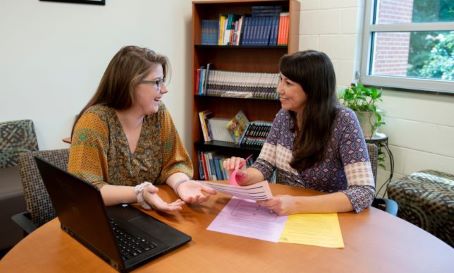Suite 201 Advising

Welcome to Suite 201 Advising! Our goal is to provide you with a central location for all of your advising needs. It is our experience that students, who follow their curriculum checklist, meet regularly with advisors, and foster relationships with mentors are most successful in their academic and career endeavors. Below, you will find links supporting your growth as a student and teaching professional.

The undergraduate Birth-Kindergarten (BK) program leads to a bachelor of science degree. The BK program is offered completely online with a concentration in either early childhood or professional education, which leads to teacher licensure. The B.S. in Birth-Kindergarten is comprised of:
- Liberal Studies Coursework
- BK Major Core Courses
- BK Concentration Coursework
FOR MORE INFORMATION:
Please visit the Birth-Kindergarten Program Webpage or contact:

Deb Henry
Academic Advisor

Greg McLamb
Academic Advisor
Bachelor of Science in Inclusive Education (B.S.Ed.)
The Inclusive Education (IE) major is a dual licensure program that prepares candidates to be recommended for an

Exceptional Children-General Curriculum (K-6) license and an Elementary Education (K-6) license through the NC Department of Public Instruction. The B.S.Ed. in Inclusive Education will prepare students to work with exceptional children in an inclusive environment at the elementary level. The program is 126 credit hours comprised of:
- Liberal Studies
- Professional Education Sequence Courses
- Inclusive Education Major Coursework
- Service Learning Requirement
FOR MORE INFORMATION:
Please consult the Inclusive Education program webpage for more information, including a curriculum guide/8 semester plan and details about the service learning requirement.

Bridget Lopez
Academic Adviso r
Graduate-Level Programs in Special Education
The Special Education Program currently offers four types of post-baccalaureate degrees and certificate programs: two graduate degrees, the Master of Arts in Education (M.A.Ed.) and the Master of Arts in Teaching (M.A.T.), Graduate Certificates in Special Education, and an add-on Academically or Intellectually Gifted (AIG) licensure program. We are also proud to support current educators with professional development credential programs. Courses in alll graduate level special education programs are offered online.
FOR MORE INFORMATION:

tABATHA Gillett
Academic Advisor
The Health and Physical Education (HPE) program leads to bachelor of science in education degree and a recommendation for a K-12 license to the NC Department of Public Instruction (DPI). The HPE program consists of:
- Liberal Studies
- Professional Education Sequence Courses
- HPE Major Coursework
- First Aid & CPR Certification
- 50 hours Community Service/Professional Involvement Component

heather McGuire
Senior Academic Advisor

Bachelor of Science in Middle Grades Education (B.S.Ed.)
The undergraduate Middle Grades Education program leads to a bachelor of science in education (B.S. Ed.) degree and recommendation for licensure to the North Carolina Department of Public Instruction (DPI) for grades 6-9 initial licensure. The Middle Grades B.S.Ed. is a 120-125 hour face-to-face program that is comprised of:
- Liberal Studies
- Professional Education Sequence Courses
- Middle Grades Major Coursework
- Academic Concentration Coursework
FOR MORE INFORMATION:

Jenny Stewart
Director of Student Success
Master of Arts in Middle Grades Education (M.A.Ed.)
The MAEd in Middle Grades Education program requires 30 semester hours of graduate study consisting of 12 hours of professional core and 18 hours of concentration coursework. Candidates may choose from the following concentrations: Language Arts/Literacy, Mathematics, and STEM Education. Each of the middle grades concentrations leads to a recommendation for Advanced Competencies licensure from the North Carolina Department of Public Instruction. Completion of degree requirements includes a satisfactory portfolio demonstrating advanced competencies for all concentrations. Candidates with current National Board Certification in the concentration area have demonstrated advanced competencies and are exempted from the required portfolio.
FOR MORE INFORMATION:

heather McGuire
Senior Academic Advisor

Bachelor of Science in Elementary Education (B.S.Ed.)
The undergraduate Elementary Education (ELED) program leads to a bachelor of science in education degree and recommendation for licensure to the North Carolina Department of Public Instruction (DPI) for Kindergarten-6th grade initial licensure. The B.S.Ed. in Elementary Education is comprised of:
- Liberal Studies coursework
- Second Academic Concentration coursework
- Professional Education Sequence Courses
- Elementary Educaiton Major Courses
For students who have a bachelor's degree, but would like to earn an elementary grades teaching license, the path to initial licensure at WCU is our second bachelor's degree in Elementary Education. This face-to-face program is based on our Cullowhee campus and is comprised of 5 full-time semesters, which include a yearlong internship experience.
FOR MORE INFORMATION:

tABATHA Gillett
Academic Advisor
Master of Arts in Elementary Education
Teaching professionals looking for an advanced degree can pursue a Master of Arts in Elementary Education (M.A.Ed.). Our online-only programs offer innovative and challenging curriculums designed to prepare teachers to develop and apply research skills, expand and deepen content area knowledge, and further the understanding of child and educational psychology in order to provide opportunities for curriculum development and exploration of current methodology.
The coursework enables students to be inviting, reflective decision makers who can give leadership to the local school system in order to implement or improve elementary and middle grades programs. This program is for teachers who already have an "A" level elementary or middle grads education teaching license.
FOR MORE INFORMATION:

heather McGuire
Senior Academic Advisor
Bachelor of Fine Arts (B.F.A./B.S.Ed.) in Art Education
WCU's Art Education Program prepares and certifies students to teach art to students in grades K-12. Nationally accredited and recognized, the program supports a studio approach to art teaching and emphasizes cross-cultural arts awareness. Students apply for entrance into the College of Fine and Performing Arts through a portfolio upon completion of 100-level art courses and students apply for entrance into the College of Education during the semester in which they take EDCI201 Introduction to Education.
Those students who pursue the BFA with emphasis in Art Education must apply for entrance into the program by submitting a portfolio of digital images and a letter of application that describes their goals and interests in the field. Students may do this either as entering first year students or as first-semester sophomores.
The program is comprised of:
- Art and Art History Courses
- Professional Education Courses
- Liberal Studies Coursework
Art Education majors do not have to minor, but select a ‘specialty” area in art in which they can take nine hours of intermediate and advanced courses.
Sixty hours of classroom visitation are required before a student does the final student teaching experience or internship at either a public elementary, middle or secondary school.

Deb Henry
Academic Advisor
Master of Arts in Teaching (M.A.T.)
If you already have a bachelor’s degree and would like to teach, the Master of Arts in Teaching (MAT) allows you to earn an advanced degree and a teaching license at the same time. The MAT’s Art concentration leads to an initial K-12 license in Art Education at the end of phase 1 and an advanced license and master’s degree conferral at the end of phase II.

Rachel Wike
Academic Advisor
Bachelor of Music Education (B.M./B.S.Ed.)
The Music Education program provides students with the thorough training necessary to be a successful music educator in the public schools of North Carolina and the region. The program includes six semesters of lessons, courses in teaching the various musical instruments and voice, music education methods and materials, and a semester of student teaching. The School offers two concentrations within this degree program:
- The Instrumental Music concentration prepares students to teach beginning band, concert band, and marching band in middle school and high school.
- The Choral/General Music concentration prepares students for a career in teaching general music at the elementary school level or choral music at the middle- or high-school level.
NOTE: Candidates for the Bachelor of Music with a concentration in music education (B.M.) also receive the Bachelor of Science in Education (B.S.Ed.) degree. Our graduates enjoy an excellent rate of placement into teaching positions.
The Music Education program is comprised of:
- Liberal Studies
- Professional Education Sequence Courses
- Music/Music Education Major Coursework
- General Electives and Music Electives
Important Information for prospective Music Education Majors:
- A live audition is required for entry into the music education program. Please visit
the School of Music's Admission and Auditions webpage for more information.
- Your primary academic advisor within the School of Music is your studio instructor.
FOR MORE INFORMATION:

Bridget Lopez
Academic Advisor

tABATHA Gillett
Academic Advisor
Bachelor of Science in Mathematics Education (B.S./B.S.Ed)
The Mathematics Education program prepares students to work as high school mathematics teachers in North Carolina and the region. Students take courses based in the Department of Mathematics and Computer Science and WCU’s nationally award-winning School of Teaching and Learning. Mathematics Education students repeatedly have won recognition as the Outstanding Mathematics Education Student for the western region of the state from the North Carolina Council of Teachers of Mathematics.
Admissions to the Mathematics Education Program
Students seeking admission to the Mathematics Education Program must declare their major and meet the requirements for admission to the Teacher Education Program.
Admission to the Professional Education Sequence
Students in Professional Education must be admitted to the Teacher Education Program and are subject to all of the teacher education requirements. EDCI 201 is the only course in the professional education sequence that may be taken prior to admission to teacher education.
Continuation in the Mathematics Education Program
To continue in the program, students must meet the continuation requirements of the Teacher Education Program. In addition to these requirements, a student enrolled in the BSEd in Mathematics must also be enrolled
in the BS Mathematics with the Mathematics Education Concentration. If hours taken in the major also meet Liberal Studies requirements, more hours may need to be completed to meet the total hours required for the degree.
This program is 120 credit hours comprised of:
- Liberal Studies
- Professional Education Sequence Courses
- Math/Math Education Major Coursework
- General and Math Electives
FOR MORE INFORMATION
Mathematics Degree Programs

Heather McGuire
Senior Academic Advisor

Bachelor of Science in English Education (B.A./B.S.Ed.)
Western Carolina University’s degree program in English education is for students who love language and literature and want to make a difference by teaching. Graduates earn two degrees, which gives them plenty of job choices after graduation. Successful completion of the English education program will lead to a Bachelor of Science in Education (B.S.Ed.) and an initial N.C. teaching license in English at the secondary level (9-12).
The English Education degree requires:
-
-
- Liberal Studies Coursework
- Professional Education Sequence Courses
- English Education Major Coursework
- World Language Courses
- Literature and General Electives
-
FOR MORE INFORMATION:

Jenny Stewart
Director of Student Success
Master of Arts in Teaching (M.A.T.): English Education
If you already have a bachelor’s degree and would like to teach, the Master of Arts in Teaching (MAT) allows you to earn an advanced degree and a teaching license at the same time. The MAT’s ENGLISH concentration leads to an initial license for grades 9-12 in English Education at the end of phase 1 and an advanced license and master’s degree conferral at the end of phase II. The program is comprised of:
Phase I: Initial Licensure
- Professional Education Core Coursework
- Methods, Internship, and Seminar Courses
Phase 2: Advanced Licensure and Master's Degree Conferral
- Professional Core Coursework
- Advanced English Content Courses

tABATHA Gillett
Academic Advisor
Bachelor of Science in Science Education (B.S.Ed.)
The Secondary Science Education program prepares students to teach high school science. Students can choose a concentration in biology, chemistry, earth sciences, or physics. Graduates receive a bachelor of science in education (B.S.Ed.) degree and recommendation for a 9-12 license to the NC Department of Public Instruction (DPI). There’s no better place to explore the sciences than at WCU, minutes away from the national park in one of the most biologically diverse regions of the world.
The Comprehensive Science Education degree consists of:
- Liberal Studies Coursework
- Professional Education Sequence Courses
- Science Education Major Coursework (Choose from Biology, Chemistry, Earth Sciences, or Physics)
- General Electives
FOR MORE INFORMATION:

Heather McGuire
Senior Academic Advisor
The Secondary Social Science Education program prepares students to teach high school social sciences. It is a dual degree program that leads to a bachelor of science in education (B.S.Ed.) degree and either a bachelor of science (B.S.) or bachelor of arts (B.A.) in History degree and recommendation for a 9-12 license to the NC Department of Public Instruction (DPI).
The Secondary Social Science Education degree consists of:
- Liberal Studies
- Professional Education Sequence Courses
- Social Science Education/History Major Coursework
FOR MORE INFORMATION:

Heather McGuire
Senior Academic Advisor

Greg McLamb
Academic Advisor
